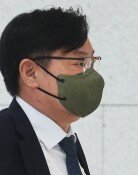Court Authority
Judges have a special penchant for authority. There is something to be said for the authority of a judges robe, the court and courtrooms. All Korean laws, from the Constitution and a law on court organization to the Criminal Procedure Code, refer to judges as judicial officers. Judges like to be called judicial officers since they think the title gives them more authority. The title of Supreme Court justice has a similar history. Until Gen. Park Chung-hee seized power through a coup détat on May 16, 1961, those on the Supreme Court had been called justices. Park, however, downgraded their title by calling them judges. After the 1987 pro-democracy movement, the title of justice was restored at the Supreme Court.
In the U.K., judges at criminal courts have worn white wigs since medieval times. Though considered anachronistic, the practice continues to show the dignity of judges and courts. In a similar vein, judges in Korea wear black robes and ties. Gray-haired judges also look more trustworthy than younger ones. Attempts by judges to make them look more authoritative are understandable to an extent.
The authority of a judges robe, the court and courtrooms, however, is for those who stand trial, not for judges. In this sense, what the late judge Kim Hong-seop did offers many lessons to judges. Kim impressed many by saying to defendants who received the death penalty in 1961, In the eyes of God, I am no different from a criminal. Please understand that I punish you due to my inability. Several days after handing down the sentences, Kim visited their families and offered to help their livelihoods. People recognized his authority since Kim showed what true authority is. He was always afraid of a human condemning his or her fellow humans and maintained a humble attitude.
Substance is more important than appearance in court as well. Disputed rulings by certain young judges are part of what undermines the authority of judges. Inappropriate behavior and words in courtrooms are also the target of a parliamentary inspection of the Supreme Court. Monitoring of courtrooms also found that many judges ignore and talk down to defendants, interrupt testimonies, fail to inform the accused of their right to remain silent, and even doze off in a trial. In one case, a young judge aroused criticism by talking down to a senior judge. The people and not judges will determine the authority of the court.
Editorial Writer Yook Jeong-soo (sooya@donga.com)
Headline News
- Med professors announce intention to leave hospitals starting Thursday
- Bridge honoring Sgt. Moon Jae-sik unveiled in Pennsylvania
- Chief of Staff Chung tells presidential secretaries to stay away from politics
- US FTC bans noncompete agreements
- N. Korea launches cyberattacks on S. Korea's defense companies







